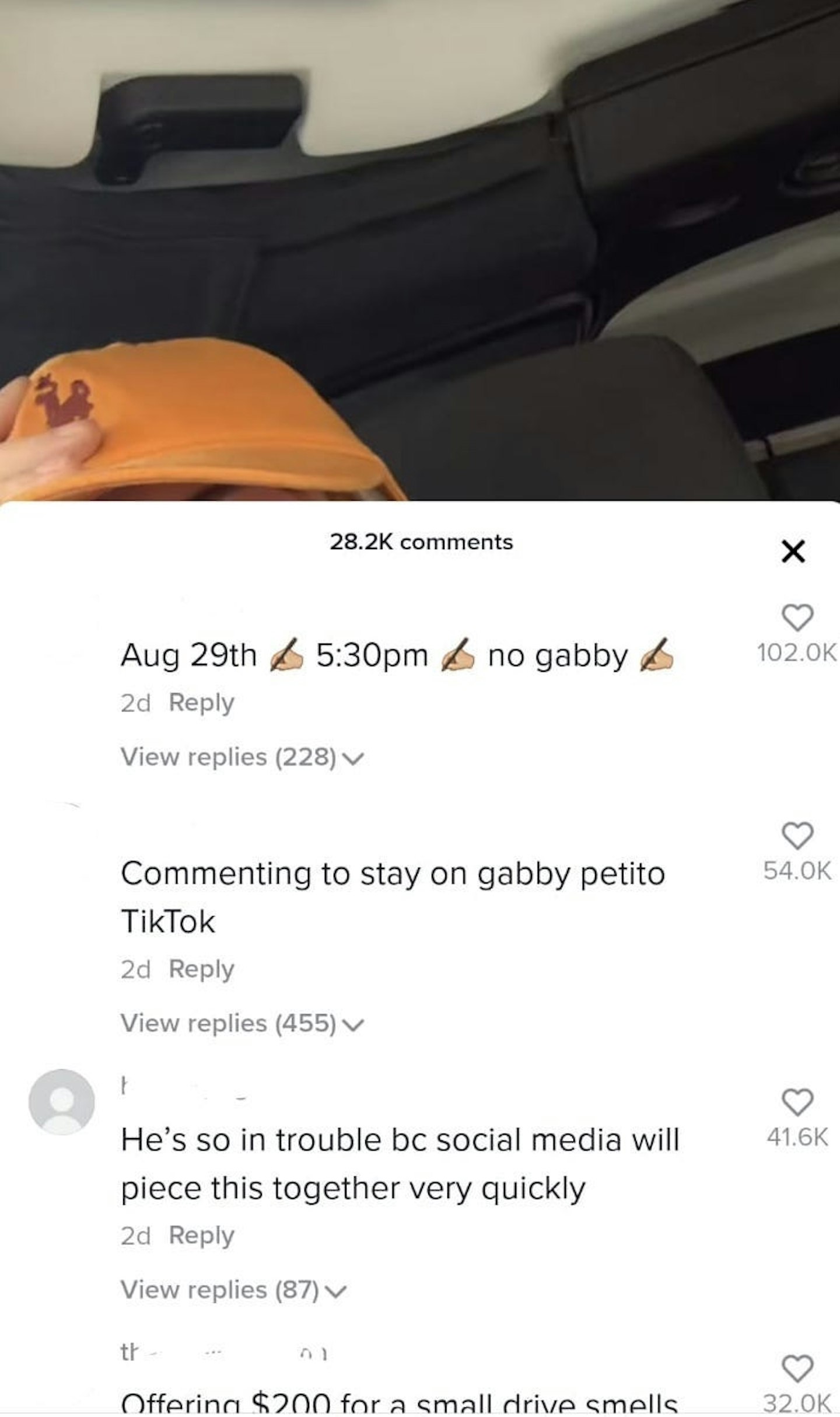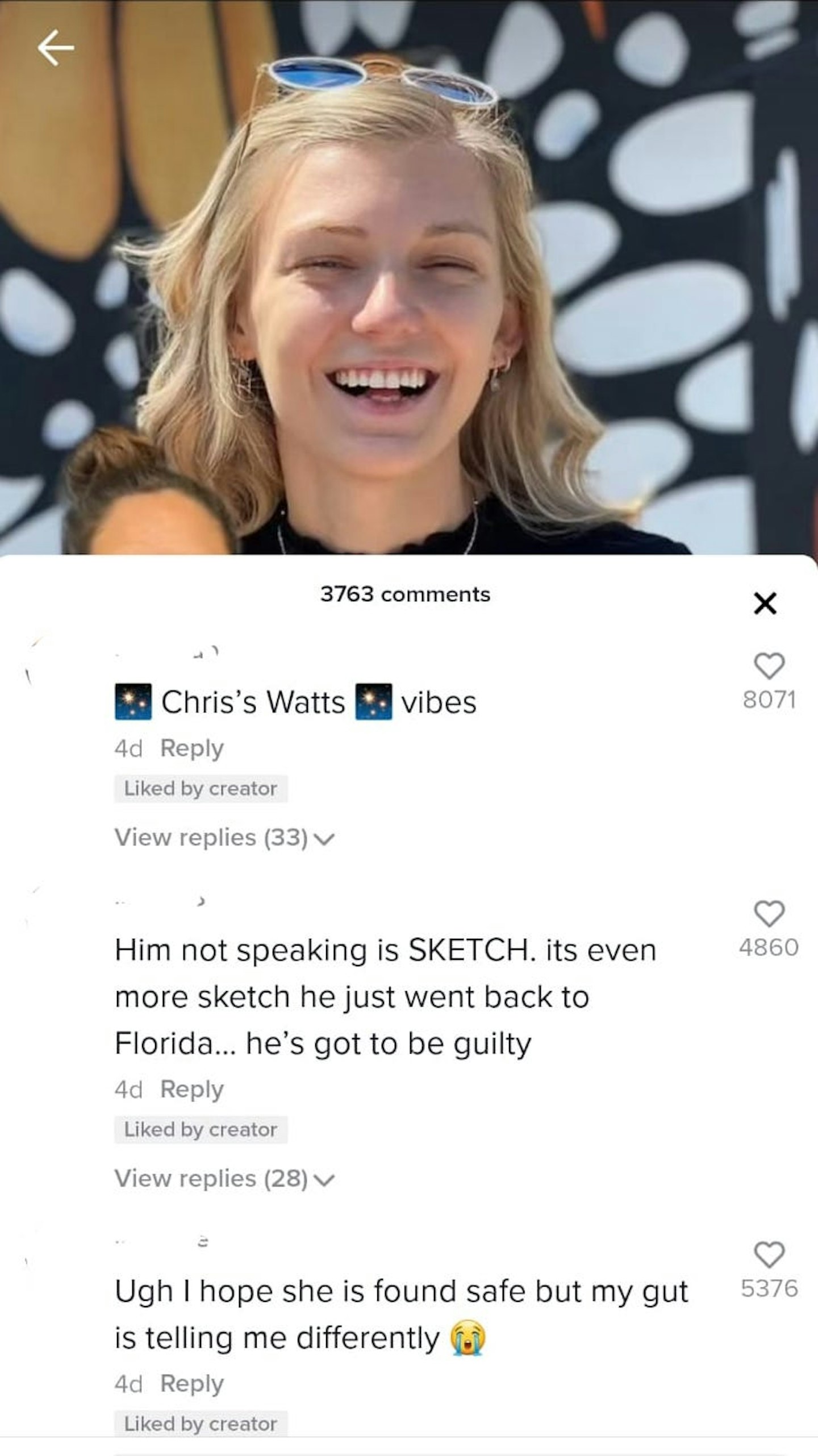Today, the FBI have confirmed that the body found along the border of Grand Teton national park is Gabby Petito and that her death has been ruled a homocide. Gabby was found on Sunday near an undeveloped camping area north-east of Jackson, Wyoming with the Teton county coroner, Brent Blue, unable to disclose the cause of death until final autopsy results are completed.
Gabby had been travelling across the country with her fiancé, Brain Laundrie, who has been declared a ‘person of interest’ in the case but has not been charged with any crime. Brian declined to talk to police when requested, and disappeared a few days later - he is still yet to be found. He and Gabby had been travelling since July in a campervan, but Brian returned home on the 1st of September without her.
Gabby’s family reported her missing 10 days later and according to investigators, his family state they have not seen Brian since Tuesday 14th. Teams were sent out last weekend to search a 25,000-acre wildlife reserve in Florida for signs of him and have received multiple other tips from the public as to potential sightings - none of which have proven legitimate as of yet.
Gabby and Brian had been documenting their van life adventure on social media, thus when her disappearance was reported in the press social media users began searching for clues in her videos as to what could have happened, and the investigation into her disappearance quickly became a trending topic. Her 'van life' video on YouTube has now been viewed over 3million times.
On Sunday evening, Jones told reporters that tips from the public had been ‘remarkable’, with interest clearly incredibly high. In the UK alone, Gaby Petito’s name has been searched over 200,000 times with breakout search terms including ‘Where is Brian Laundrie’, ‘Gaby Petito van video’, ‘Gaby Petito bodycam video’.
The latter term relates to a bodycam footage police released of Gabby from 12th August, when they were called to a possible domestic violence incident while travelling through southern Utah. Petito can be seen crying and explaining that the couple had been arguing more frequently, with the officer recommending they spend the night apart but not filing any charges.
But there are also more specific search terms, like ‘4pm MDT to UK’, relating to the time Gabby disappeared and other clues in the case. What’s clear from all of this is that everywhere around the world, social media users wanted to solve her disappearance.
In fact, search Gaby Petito’s name on TikTok and you will find an endless number of videos with theories on her disappearance. These videos include personal sightings of Brian prior to his disappearance, in-depth analysations of Gabby’s YouTube videos and conspiracy theories as to what happened. Some of them have over 14million views, with users commenting things like ‘social media will solve this before the police’.
But watching these videos for yourself, seeing the comments pile up, there’s something increasingly sinister about the way Gaby’s death is being treated online. There’s no doubt that public interest in this case has aided awareness and, potentially, tips to the police. It’s incredible that people are taking the time to try and ensure a woman’s safety, but at what point does this commentary go from concern for a woman’s life, to a spectacle? Specifically, we’re referring to the videos and comment threads that are treating Gaby’s disappearance as some kind of live true crime documentary.
Just take a look at the comment section on some of these videos for proof. If you’re not familiar with TikTok, there are often trends in the way people comment on videos, from repeating certain jokes within different contexts (“It’s the [insert random thing you love or hate] for me”) to using specific emojis that denote a niche joke at that time. The trendy comment of the moment is repeated across niches because it usually gets the most likes on a video – and what is social media if not a likability competition.
In a video about someone’s disappearance, one might that need to get a ‘liked’ comment to disappear, replaced by genuine, heartfelt expressions of empathy for the victim and their family. But no, that’s not what’s happening – at least not in a lot of cases.

Instead, some people seem to be treating Gabby’s disappearance as if it’s their own personal source of entertainment, attempting to gain likes and followers by curating this true-crime style series of videos on the topic. But this is not a true crime documentary, this is a woman’s life that has been lost, this is a family who are grieving.


The fascination with true crime documentaries generally can often be uncomfortable when it comes to retelling the lives of murdered women. So often, they can take the personal trauma a family has experienced and turn it into a salacious source of entertainment to satisfy morbid curiosities (see: the 9000 Ted Bundy documentaries no one needed). In this case, that discomfort is 10-fold, because the family have barely had time to accept their loss, never mind begin grieving.
Sure, the family may be grateful for the overwhelming intrigue in Gabby’s case, but for those turning her into an object of entertainment, all for the sake of likes and follows online, it’s cruel. As we mourn her loss, remember she was a human being with a full life of loved ones who will now be inconsolable - Gabby Petito is not a character on your favourite TV show.
Read More:
More Than Half Of Murdered Women Are Killed By An Ex Or Current Partner
Tackling Male Violence Is ‘Not A Priority’ Within The Police, Watchdog Report Finds
.jpeg?ar=16%3A9&fit=crop&crop=top&auto=format&w=1440&q=80)